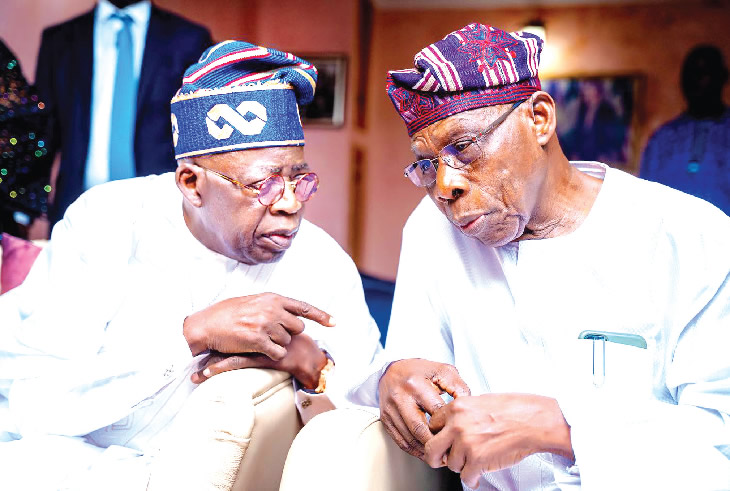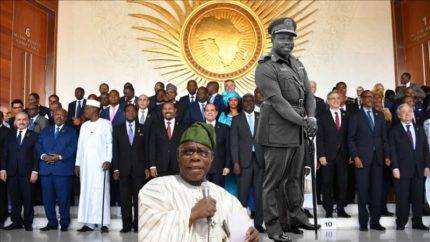Former President Olusegun Obasanjo‘s recent statement questioning the effectiveness of Western democracy in Africa has sparked widespread debate. In his assertion, he suggests the need for African intellectuals to collaboratively design an ‘African democracy.’ This prompts a critical examination of whether the issues lie within the framework of Western democracy or if the challenges are deeply rooted in the actions of the African political elite.
Obasanjo, known for his influential role in Nigerian politics, has ignited discussions on the adaptability of Western democratic models in the African context. The debate gains significance as nations across the continent grapple with political complexities, often marked by governance challenges and socio-economic disparities.
Evaluating the Suitability of Western Democracy in African Context
The viability of Western democracy in Africa has long been a subject of deliberation. Obasanjo‘s stance encourages a nuanced exploration of the challenges and opportunities associated with implementing Western democratic principles in diverse African nations. While some argue that these principles may not align seamlessly with the cultural, social, and economic realities of the continent, others emphasize the potential for adaptation and positive transformation.
The unique socio-political landscape of Africa raises questions about the compatibility of imported democratic models. Issues such as tribalism, economic inequality, and historical legacies pose challenges that may require innovative approaches to governance. Additionally, the role of the African political elite in shaping democratic institutions becomes a focal point in discussions surrounding effective governance models.
African Intellectuals and the Call for a Distinctive ‘African Democracy’
Obasanjo‘s call for African intellectuals to devise an ‘African democracy’ opens the door to a discourse on the prospects and challenges of such an initiative. Creating a distinctive democratic model for Africa requires a deep understanding of the continent’s diverse cultures, historical trajectories, and socio-economic dynamics. Intellectuals must navigate the complexities of forging a system that resonates with the aspirations of the African people while addressing inherent challenges.
The prospect of a uniquely African democracy presents an opportunity for inclusive governance structures that reflect the richness of the continent’s heritage. However, the challenges of consensus-building, overcoming regional disparities, and ensuring accountability in leadership loom large. The success of such an endeavor hinges on the collaborative efforts of intellectuals across Africa.

Western Democracy or African Political Elite
Obasanjo‘s query raises a fundamental question: are the governance challenges in Africa a result of the inherent flaws in Western democracy or the actions of the African political elite? Delving into this dilemma involves dissecting instances where democratic principles may have clashed with local realities and assessing the impact of political decisions made by African leaders.
Critics argue that blaming Western democracy might overlook internal factors that contribute to governance issues. By scrutinizing the conduct of the African political elite, it becomes imperative to address issues such as corruption, nepotism, and power concentration. Balancing the discourse between external democratic models and internal governance practices is essential for a comprehensive understanding of the challenges at hand.
Obasanjo’s Legacy: Contributions to Nigeria’s Democracy during His Presidency
To contextualize Obasanjo‘s critique, it is crucial to reflect on his contributions to Nigeria’s democracy during his presidency. Obasanjo, who served as Nigeria’s president from 1999 to 2007, played a pivotal role in transitioning the country from military rule to a democratic system. His administration implemented key reforms, including anti-corruption measures, economic policies, and efforts to strengthen democratic institutions.
Despite facing criticism for certain decisions, Obasanjo‘s legacy includes fostering a period of relative stability and economic growth in Nigeria. Recognizing his achievements provides a backdrop for understanding his current perspectives on the limitations of Western democracy in Africa and the necessity for a more indigenous approach.
Moving Forward: Exploring a Hybrid Model for Effective Governance in Africa
In response to the recent call by former Nigerian President Olusegun Obasanjo to reconsider democratic frameworks in Africa, there emerges a unique opportunity to forge a new path for governance on the continent. The proposition on the table revolves around adopting a hybrid governance model that amalgamates the proven strengths of Western democratic systems with a keen consideration of Africa’s distinct challenges and cultural nuances.
As discussions gain momentum, the focus is on striking an intricate balance—one that upholds universal democratic principles while being adaptable to the specific needs of African nations. The aim is to create a governance system that is not merely an imported copy but rather a homegrown solution catering to the diverse dynamics of the continent. This ambitious endeavor requires active collaboration among African leaders, intellectuals, and the wider society to weave together a fabric of governance that resonates with the aspirations of Africa’s people. The ongoing dialogue sparks hope for a future where a uniquely African democracy could become a symbol of effective and sustainable governance.
In navigating this uncharted territory, the emphasis is not only on learning from existing democratic models but also on leveraging the rich cultural tapestry of Africa. The vision is to transcend the limitations of borrowed systems and build a governance structure that authentically reflects the values and experiences of the diverse African populace. As the exploration of this hybrid model gains traction, it stands as a testament to the continent’s commitment to progress and innovation in the realm of governance, paving the way for a potentially transformative era in African political landscape.
Table of Contents
Discover more from OGM News NG
Subscribe to get the latest posts sent to your email.














